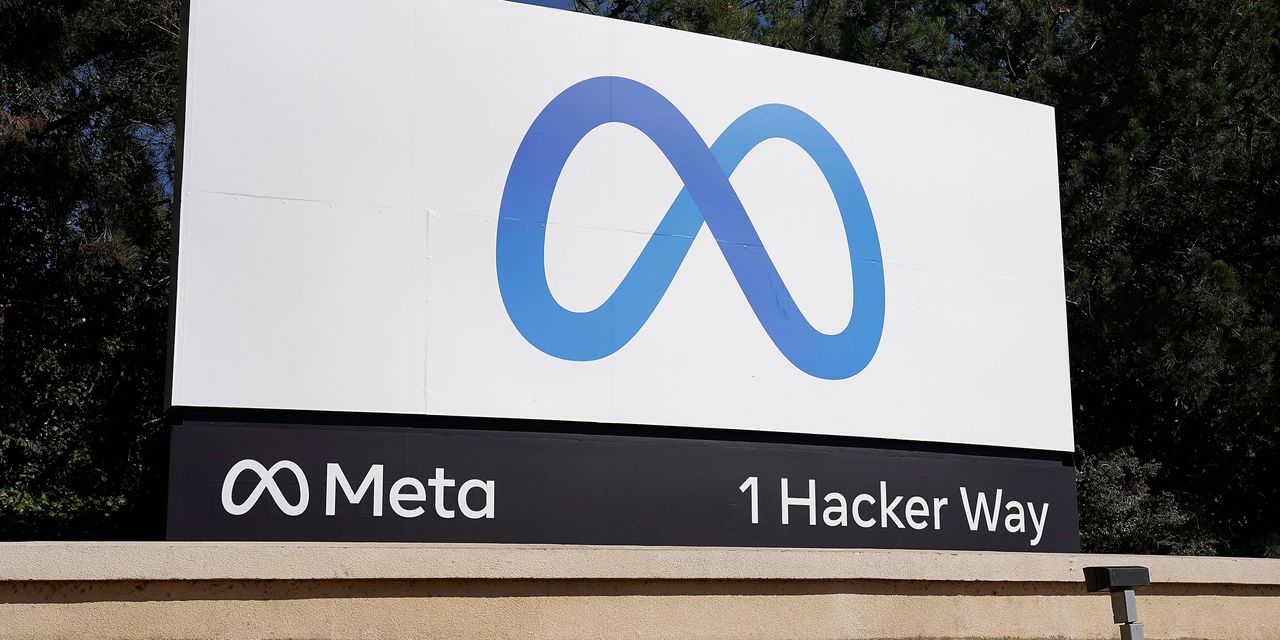The second quarter was as bad as Meta Platforms Inc. executives feared, and the third quarter is expected to be worse.
Meta
META,
reported its first-ever year-over-year decline in revenue on Wednesday, and profit declined for a third consecutive quarter, the first time that has happened since Facebook’s first year as a public company, in 2012. Shares declined more than 3% in after-hours trading immediately following the release of the results, continuing a downward trajectory for the social-media company’s shares.
The parent company of Facebook reported second-quarter earnings of $6.69 billion, or $2.46 a share, down from $3.61 a share last year, on sales of $28.82 billion, down from $29.08 billion a year ago. Both results missed the average forecast for profit of $2.54 a share and sales of $28.9 billion, according to analysts polled by FactSet.
The downfall is expected to get worse. Meta executives issued a third-quarter revenue forecast of $26 billion to $28.5 billion, while analysts were forecasting $30.36 billion. Facebook reported revenue of $29.01 billion in the third quarter last year.
“This outlook reflects a continuation of the weak advertising-demand environment we experienced throughout the second quarter, which we believe is being driven by broader macroeconomic uncertainty,” Meta said in a release. “We also anticipate third-quarter Reality Labs revenue to be lower than second-quarter revenue.”
Facebook also announced that longtime Chief Financial Officer David Wehner will transition to a new role as chief strategy officer. Susan Li, Meta’s vice president of finance, will take over the CFO role.
Facebook executives have blamed inflation, a decline in ad sales, the war in Ukraine, supply-chain issues, increased competition from services such as TikTok, and — most significantly — wrenching changes Apple Inc.
AAPL,
made to its mobile operating system that make it more difficult for apps to track consumers in ads.
“Facebook’s awful quarter and weak outlook further underline the view that advertisers have been cutting back on spending as the overall economy battles with inflation, higher interest rates and shifting consumer patterns,” Investing.com senior analyst Jesse Cohen said. “Looking ahead, Facebook still has to figure out how to deal with Apple’s new privacy approach that limits tracking users as well as the growing popularity of TikTok. In addition to the plethora of headwinds the company is facing, investors now need to worry about the negative impact of potential regulatory actions by the U.S. government.”
Earlier Wednesday the Federal Trade Commission, citing unfair competition, sued to block Meta from buying virtual-reality firm Within Unlimited.
The dire results landed with a thud after light results from Google parent Alphabet Inc.
GOOGL,
GOOG,
on Tuesday, deepening concerns that ad-dependent internet companies face a long patch because of a war raging in Ukraine and inflation burning through the pocketbooks of consumers. Last week, shares of Snap Inc.
SNAP,
and Twitter Inc.
TWTR,
nosedived after they reported weak results.
Read more: Google stock rises despite an ad downturn, second straight earnings decline
CEO Mark Zuckerberg’s warning of an economic tsunami nearly a month ago will likely lead to fewer hires and cost cutting, the company reiterated in an email message on Tuesday.
“Any company that wants to have a lasting impact must practice disciplined prioritization and work with a high level of intensity to reach goals,” a Meta spokesperson said in a statement to MarketWatch. “The reports about these efforts are consistent with this focus and what we’ve already shared publicly about our operating style.”
How Meta fares in the near future rests in large part on its audience, which establishes advertising rates and frequency. Daily active users, or DAUs, a crucial metric for Meta’s growth globally, increased 4% to 2.88 billion, topping analyst expectations of 1.96 billion and returning to growth after the first-ever decline in that metric last quarter.
“Zuckerberg did a good job of lowering expectations,” Lindsey Bell, chief markets and money strategist at Ally Invest, told MarketWatch. Facebook’s higher ROI, she added, has made it and Google “somewhat insulated” to the same market conditions that have gashed Snap and Twitter.
Still, Meta’s stock has been among the worst in tech this year, plummeting 50% so far, while the broader S&P 500 index
SPX,
has retreated 17% in 2022.
